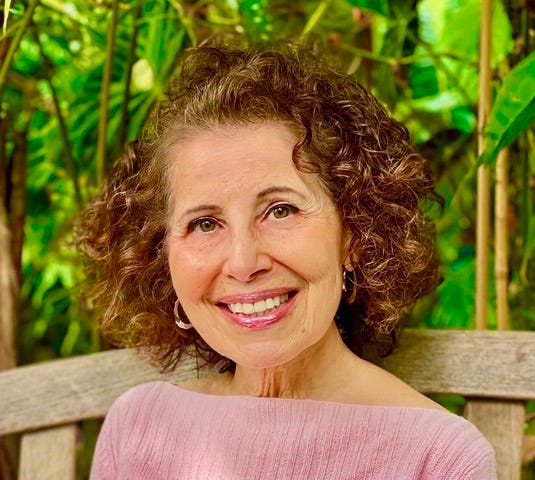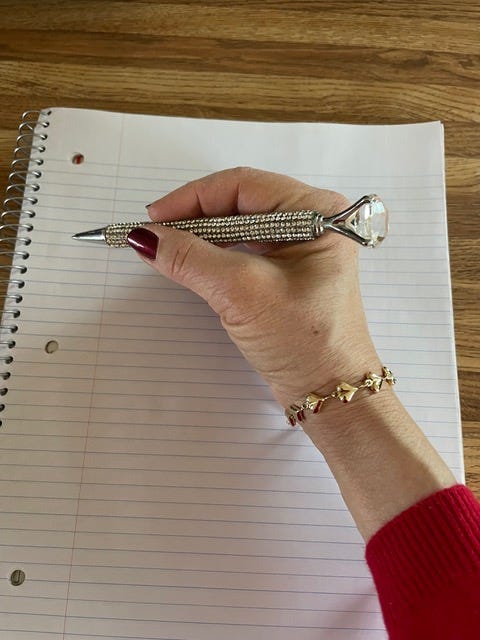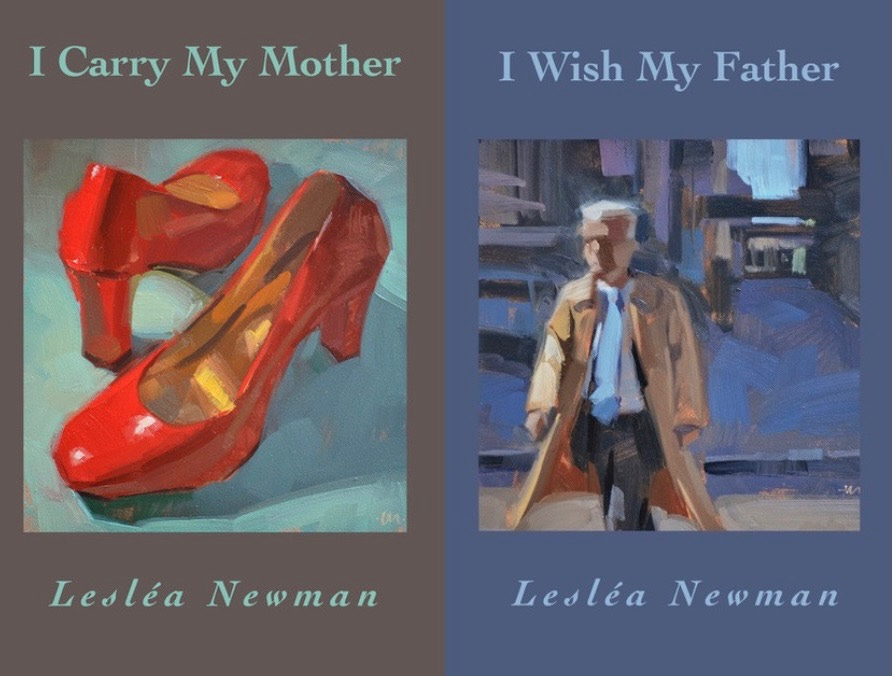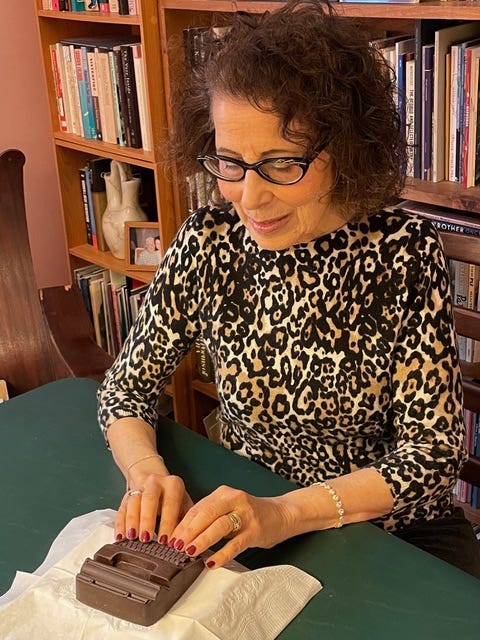"One never becomes perfect at it. That’s why it’s called practice!"
author Lesléa Newman on the power of first thoughts, writing as a way to cope with grief, and what she learned from studying with Allen Ginsberg
This is a Beginner’s Mind interview, a series that explores the intersection of mindfulness and creative practice. Zen master Shunryū Suzuki Roshi said, “In the beginner’s mind, there are many possibilities; in the expert’s mind, there are few.” This series shines a light on the practices that sustain people in their daily lives and open the path to new possibilities. If you know (or are) a writer, creative person, teacher, or practitioner with practices you’d like to share, just reply to this newsletter to be in touch with me. Subscribe below to make sure you don’t miss any future interviews.✨✨
I first learned of Lesléa Newman decades ago when I happened upon a copy of her book Heather Has Two Mommies in a bookstore. Heather Has Two Mommies was the first children’s book to portray a lesbian family, and it has had a massive cultural impact and continues to be beloved by readers. Rachel Maddow said of this book: “Heather Has Two Mommies, a gentle-sweet-natured book that acknowledges the existence of different family structures, has been a resource for libraries and schools, a relief for parents and educators, and a delight to kids from all kinds of families. It has become a national touchstone, and ultimately a historic landmark of American cultural progression and regression. You really should read this book again—it will make your day and it changed the world.”
Since then, Lesléa has written many more books for kids and adults, covering subjects like Jewish and lesbian identity, AIDS, eating disorders, butch/femme relationships, and sexual abuse, and she’s still going, writing in a wide variety of genres1. I think you’ll love what Lesléa shares in this interview about what she learned from studying with Allen Ginberg, the power of first thoughts, and writing as a way to cope with grief. She also shares a fantastic writing prompt based on Joe Brainard’s I Remember, which you might need right now. ✨✨
What is your writing practice like? Do you have any writing rituals that help you?
My goal is to write first thing in the morning when it is quiet and the day has barely begun. I can’t say that I do this every day, but I can say that I do this on most days. I meditate for about 15 minutes, then pick up my pen and notebook and free-write at least 3 pages (which is usually mostly gibberish). At some point, with any luck, something interesting happens on the page. which I can work with and hopefully develop. That isn’t always the case, but I know from decades of writing practice that it’s all part of the process.
I don’t know what is going to happen when I pick up my pen and start writing, but I do know what is going to happen if I don’t pick up my pen and start writing: nothing. And that makes me a very unhappy camper. Even a bad day of writing is better than a day of not writing at all.
What are your mindfulness practices?
For me, mindfulness comes from sitting still. I was lucky enough to attend Naropa Institute (now Naropa University) in the early 1980’s where I was taught basic meditation, simply following the breath in and out, disrupting thought, and returning to the breath. It sounds easy, but it isn’t!
The mind likes to be busy, and distractions abound. It’s challenging to pull oneself away from thought and go back to breath. One never becomes perfect at it. That’s why it’s called practice!
Do you have a mantra or motto related to your creative and mindfulness practices?
In addition to studying meditation at Naropa, I studied poetics with Allen Ginsberg, whose voice is always close to my ear.
“First thought, best thought” was his mantra and now it is mine.
Meaning that we always return to the original source—the idea or image that first occurred to us—and keep writing from there.
Allen told me that writing is 33% inspiration, 33% respiration, and 33% perspiration. I quickly did the math and realized that this only added up to 99% so I asked Allen what the missing 1% was. With a gleam in his eye he held up one finger and declared, “Magic!”
Do you see your creative and mindfulness practices as connected? In what ways?
I find that both meditation and writing are means of exploring the world outside of me, the world inside of me and the relationship between the two. My writing practice is my spiritual practice. It has been my constant companion for more than 60 years and it has pretty much taught me everything I know about myself about relationships, and about the world.
How have creative and/or mindfulness practices helped you in your life?
My creative practice helped me tremendously when I was grieving the loss of both of my parents. My mom died of cancer in 2012 and the last few years of her life were very difficult. I was her main caretaker. After she died, the way I processed this experience was to write a book of poems about our journey together. My mom loved poetry; I chose to write each poem in form (sonnet, haiku, villanelle, etc.).
Writing the poems that became the book, I CARRY MY MOTHER kept her close to me for a little while longer. Same with my dad, who died in 2017. He was lucky in a way, he died in his sleep (I think he died of a broken heart; it was just too hard for him to keep living without my mom, his wife of 63 years). My book about my dad consists of narrative poems, some of them quite humorous—he was a very funny guy. Again, writing the poems that turned into the book I WISH MY FATHER helped me stay connected to him. And now when I give readings from both books, it’s like my parents are there in the room and it is a joy to share them with others.
A Prompt from Lesléa
My favorite writing prompt is based upon the book I REMEMBER, by Joe Brainard. The writing exercise is actually very much like meditation.
All you do is write the two words, “I remember” down on a piece of paper (or type it into your computer).
And then write a sentence or two, no more than that—whatever comes to mind (First thought, best thought!).
Then return to the phrase “I remember.” Write it down again and write whatever comes into your mind next, just a sentence or two.
Rinse and repeat. Soon you will have a whole list of memories and you can choose one to develop. There are many variations to this. You can add a person’s name, “I remember Mom….” or a verb, “I remember screaming….” or a place, “I remember Manhattan…” or a time, “I remember 1970.” Returning to the phrase “I remember” while writing is like returning to the breath while meditating. I often use this exercise when I don’t know what to write next and it has proven to be very fruitful.
Lesléa Newman has created 87 books for readers of all ages including the memoirs-in-verse, I Carry My Mother and I Wish My Father; the novel-in-verse, October Mourning: A Song for Matthew Shepard; and the children’s books, Sparkle Boy, Heather Has Two Mommies, Joyful Song: A Naming Story, The Babka Sisters, and Ketzel, The Cat Who Composed. Her literary awards include a poetry fellowship from the National Endowment for the Arts, two National Jewish Book Awards, two American Library Association Stonewall Honors, and the Association of Jewish Libraries Sydney Taylor Body of Work Award. A past poet laureate of Northampton, Massachusetts, she currently teaches at the The Naslund-Mann Graduate School of Writing.
Follow Lesléa on Facebook, on Bluesky for updates, and learn more about her books at her websites: www.lesleanewman.com and www.lesleakids.com.
Here’s the link to order Lesléa’s poetry collection, I Carry My Mother (Headmistress Press, 2015), and her poetry collection, I Wish My Father, Headmistress Press, 2021).
Read this great profile of Lesléa and her work chronicling queer history at The Advocate.
Catching up with Contributors
Cameron Barnett has a new chapbook out in the world! The Bones We Lose. Order your copy here: https://4thriver.submittable.com/submit! (published by The Fourth River Journal, a publication of Chatham University’s MFA Program). A bit about this chapbook: “Silas Coburn has led dishonest and disgraceful life, and it has taken a toll on everyone he has come in contact with. In The Bones We Lose, part poetry and part story, a mythologized Pittsburgh is the setting for an ancient curse that follows the character principally known as The Note Broker. In this chapbook, building on poems that first appeared in The Drowning Boy’s Guide to Water, all attempts to build family, love, and legacy have gone awry, leaving people “honeycombed with regret.” In this world, “He knows how a collarbone can feel / like the slack of a noose waiting to snap.”
M.C. Benner Dixon’s debut novel, The Height of Land, (winner of the Orison Fiction Prize, selected by Tania James) comes out on April 1st! Learn more about the book HERE and pre-order your copy HERE! Here’s what Tania James had to say about the book: "The Height of Land is a refreshing approach to the post-apocalyptic novel, showing us both the possibilities of collective action and the power of a single dissenting voice. That voice belongs to Red, a boy desperately searching for spiritual meaning and connection. I’ve never encountered a novel quite like this one, nor a character like Red, whose questions and observations followed me long after I finished this profoundly affecting book."
Felicia Savage Friedman is leading a 4-part workshop series on Collective Liberation through Embodied Joy. Each workshop provides three hours of continuing education credits. Link for details HERE.
IN CASE YOU MISSED IT at Be Where You Are
Be Where You Are is 100% reader-supported. You can support this work by becoming a paid subscriber. Or, just send it to a friend! 🩵
Be Where You Are is a newsletter about how to use writing and mindfulness to live more fully where you are. If you have ideas to share for future workshops, you can reach me by replying to this email. I’d love to hear from you! You can also find me on Bluesky or Instagram or find more info at my website. ✨✨
https://www.advocate.com/advocates/leslea-newman-queer-history-advocates










